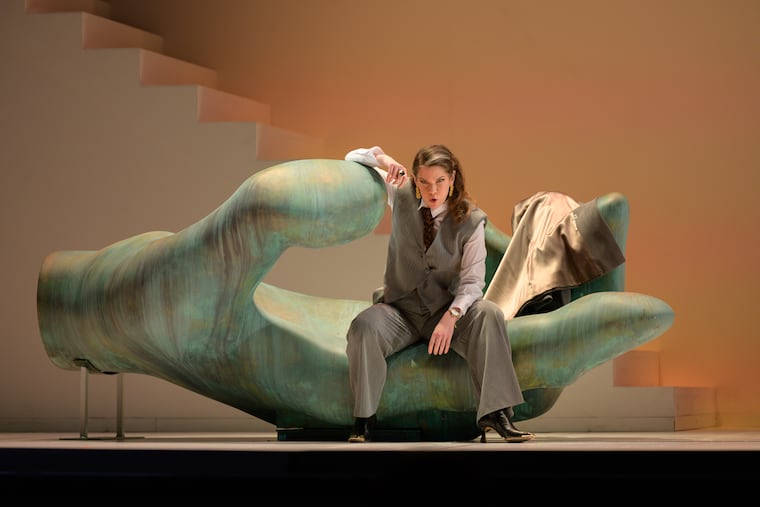Opera Philadelphia needs an annual holiday-time production like ‘Nutcracker’
Our classical music critic loves how the company is pushing the art form forward. But we still need the Puccinis and Verdis to drive business.

Looking at Opera Philadelphia’s newly announced season, you have to wonder what the future of traditional opera in Philadelphia might be. The company is doubling the number of performances — a healthy sign — and yet the 2025-26 lineup doesn’t have a single title with any name recognition.
No Puccini, no Verdi. No Mozart, let alone Wagner or Strauss. There is one Rossini work, but it’s Il viaggio a Reims (The Journey to Reims), a score so off the beaten track, the Metropolitan Opera has never performed it.
Opera Philadelphia is counting on its popular $11-or-higher pricing program — whose single tickets go on sale Thursday — to sell out the house, and sell out I hope they do.
But long-term, having an audience large enough to sustain opera in the city depends on a genre that’s not on the schedule next season: operas with familiar titles and tunes memorable enough that audiences have something to grab hold of.
Longer term, the future hinges on a kind of opera Opera Philadelphia has rarely done, which is a production aimed specifically at children.
Like The Nutcracker, but opera.
Almost anyone who has seen-heard the piece gets a certain feeling just reading the title. The music is so colorful and velvety it sounds like the score is notated in fondant icing. One year, Philadelphia Ballet went all out in the multisensory department and piped a fragrance into the Academy of Music lobby — a mélange of marzipan, sugar, spice, coffee, and candy canes — to lodge the experience in the emotional memory banks of children.
“See the music, hear the dance,” George Balanchine once said. The father of ballet in America knew all about the potential of synergy, since it was he who created the version of The Nutcracker that has kept afloat major U.S. companies, including ours. (Taste the sets, perhaps?)
Over decades, all of these elements, save the fleeting olfactory one, have been finely tuned to make The Nutcracker the best friend any artistic genre has ever had. Tchaikovsky’s ballet provides not just the lion’s share of annual ticket income each year for many ballet companies, but it is also without equal as an entry point into the art form. Young dancers graduate year to year from one role to the next in ballet school productions across the nation.
It’s mystifying that Opera Philadelphia, for all of its struggles in the past couple of decades, hasn’t launched an annual holiday-time production that is geared toward children (but surreptitiously gobbled up by adults). If the company had inaugurated such a production two decades ago when David B. Devan took over, any number of 10-year-olds in the audience then would now be getting ready to bring their children to the opera.
It seems like forever that Opera Philadelphia has been considering what kind of company it should be. Next season is Anthony Roth Costanzo’s first programmed by him as general director, and he deserves the chance to find the right mix.
As a critic, I love how he is pushing the art form forward. I’m looking forward to all of the new titles. Opera Philadelphia and other companies should be constantly mining for works that could someday become our new “traditional,” both those from the past that have been neglected as well as others yet to be written.
And there’s no doubt that generational trends have eroded the core audience for opera — that the percentage of the general public that could name that tune as an aria from La bohème or Falstaff has dropped with each of the last several passing generations.
But that doesn’t mean that the inherent beauty of Puccini, Verdi, and others has diminished. Carmen and Norma still have the power to move audiences. This music is built for emotion and memory, as anyone who left Opera Philadelphia’s recent Don Giovanni with ear worms aglow knows.
There’s a reason classical radio stations like WRTI-FM (90.1) play particular works repeatedly in rotation; the human ear likes familiarity. Recognizing music is like going home.
Opera has its Nutcrackers, at least potentially. Humperdinck’s Hänsel and Gretel is immediately memorable, which makes an obvious choice for an annual Opera Philadelphia production. It’s an effective on-ramp to the opera experience generally (plus it leads straight into Wagner). So is The Magic Flute, which is why the Metropolitan Opera created an abridged holiday-time version of the Mozart favorite in English with Julie Taymor’s fantastical, painterly visuals.
Opera Philadelphia has produced Humperdinck’s opera once before, in 2007, in the Maurice Sendak/Frank Corsaro version, and it showed the incredible impact of the piece in the right hands.
“I never did an opera when I did not feel powerfully drawn to the music — there’s no point to doing it,” Sendak told me. “You get a feeling and you search out the feeling with the pencil until it’s like the feeling you’re having. Other people either get the feeling or they don’t.”
In Sendak’s case, millions did. And millions have gotten the feeling from traditional opera, stepping onto that gateway as children and following it over a lifetime.
You can call it a good business model if you want. It also happens to be the way great art works.